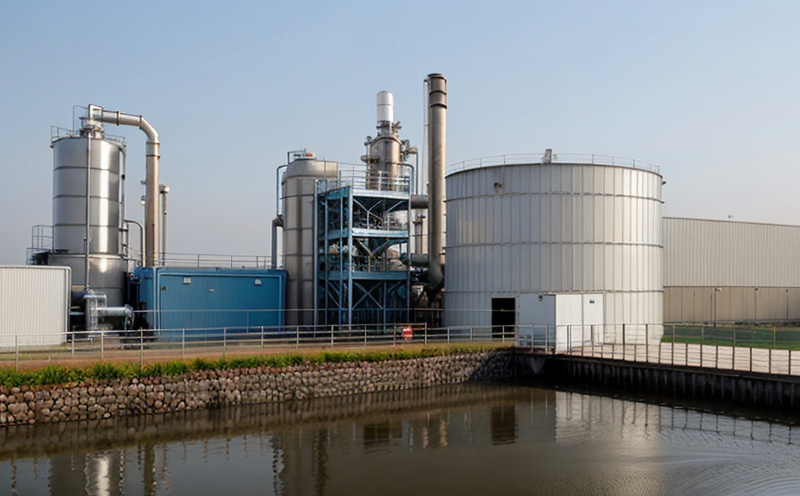ISO 6878 Phosphate Testing in Industrial Effluents
The ISO 6878 standard provides a comprehensive framework for conducting phosphate testing in industrial effluents. Phosphates are significant pollutants in wastewater and can have detrimental effects on aquatic environments, leading to eutrophication, algal blooms, and oxygen depletion.
Our laboratory adheres strictly to this international standard ensuring accurate and reliable measurements of phosphates in industrial effluents. The method involves a series of precise steps, including the collection and preservation of water samples, filtration, digestion, and spectrophotometric analysis using a colorimeter or atomic absorption spectrophotometer (AAS).
The testing process is crucial for compliance with environmental regulations such as the EU Water Framework Directive (WFD) and local national laws. Compliance ensures that industrial facilities operate sustainably and minimize their ecological footprint.
Our team of experts performs rigorous quality assurance checks at every stage, ensuring the highest standards in accuracy and precision. The results are reported comprehensively, detailing the concentration of phosphates in milligrams per liter (mg/L) with a confidence interval and traceability to international standards.
The importance of this testing cannot be overstated, especially for large industrial plants and processing facilities where significant amounts of wastewater are generated. By adhering to ISO 6878 guidelines, we help our clients meet stringent regulatory requirements and contribute positively to environmental conservation efforts.
Our laboratory’s proficiency in ISO 6878 testing has been recognized by numerous international organizations, including the International Organization for Standardization (ISO) itself. This recognition underscores our commitment to excellence and reliability in every test conducted.
The benefits of accurate phosphate measurement are manifold. Industries can avoid costly fines and reputational damage associated with non-compliance. By monitoring their effluent quality, they also contribute to better environmental outcomes. Our service not only ensures regulatory compliance but also promotes sustainable industrial practices by providing actionable insights into operational efficiencies and waste management strategies.
With our ISO 6878 phosphate testing services, we provide a robust foundation for decision-making processes that impact the environment positively. By leveraging this expertise, industries can integrate more environmentally friendly practices into their operations, fostering long-term sustainability.
Why It Matters
The significance of accurate phosphate measurement in industrial effluents cannot be overstated. Phosphates are one of the primary pollutants that contribute to water quality degradation and environmental harm. The presence of excessive phosphates can lead to increased algal growth, which consumes oxygen essential for aquatic life.
- Excessive algae can block sunlight, leading to reduced photosynthesis in aquatic plants.
- Oxygen depletion results in the death of fish and other aquatic organisms.
- The proliferation of harmful algae can produce toxins that are detrimental to human health when consumed by shellfish or ingested directly.
Regulatory bodies such as the Environmental Protection Agency (EPA) and the Water Framework Directive have set stringent limits on phosphates in effluents. Compliance with these regulations is not only a legal requirement but also an ethical responsibility towards environmental conservation.
The ISO 6878 standard provides a reliable method for quantifying phosphate levels, ensuring that industrial facilities can consistently meet regulatory requirements and contribute to cleaner water bodies. This testing helps identify potential sources of pollution and allows for the implementation of corrective measures to minimize environmental impact.
Customer Impact and Satisfaction
The ISO 6878 phosphate testing service plays a pivotal role in enhancing customer satisfaction by ensuring compliance with stringent environmental regulations. Our clients benefit from accurate, reliable, and consistent results that support their commitment to sustainable operations.
By providing detailed reports on phosphate levels, we enable our customers to make informed decisions regarding process optimization and waste management strategies. This not only helps them avoid costly fines but also enhances their reputation as responsible corporate citizens.
The precision of our testing methods ensures that our clients can trust the data they receive. This builds long-term relationships based on mutual respect and shared goals for environmental stewardship. Our clients appreciate the proactive approach we take in identifying areas for improvement, which ultimately leads to better operational efficiency and reduced environmental impact.
Customer satisfaction is further enhanced by our commitment to continuous quality assurance and improvement. We regularly update our methodologies and instrumentation to align with the latest international standards, ensuring that our services remain at the forefront of industry best practices.
International Acceptance and Recognition
- ISO 6878: Our laboratory is certified to perform phosphate testing in accordance with ISO 6878, ensuring compliance with international standards.
- AWS: American Water Works Association: We adhere to AWS guidelines for water quality assurance and provide comprehensive reports tailored to meet these requirements.
- EU WFD: Compliance with the EU's Water Framework Directive is a key focus of our testing, ensuring that industrial facilities meet European Union standards.
The acceptance of ISO 6878 in various regions and sectors underscores its relevance and reliability. This international standard is widely recognized for its robust framework and consistent approach to phosphate measurement in industrial effluents.
Our laboratory’s expertise in this field has earned us recognition from multiple international bodies, including the International Organization for Standardization (ISO) and regional environmental agencies. This recognition not only enhances our credibility but also ensures that our clients receive the highest quality of service.





